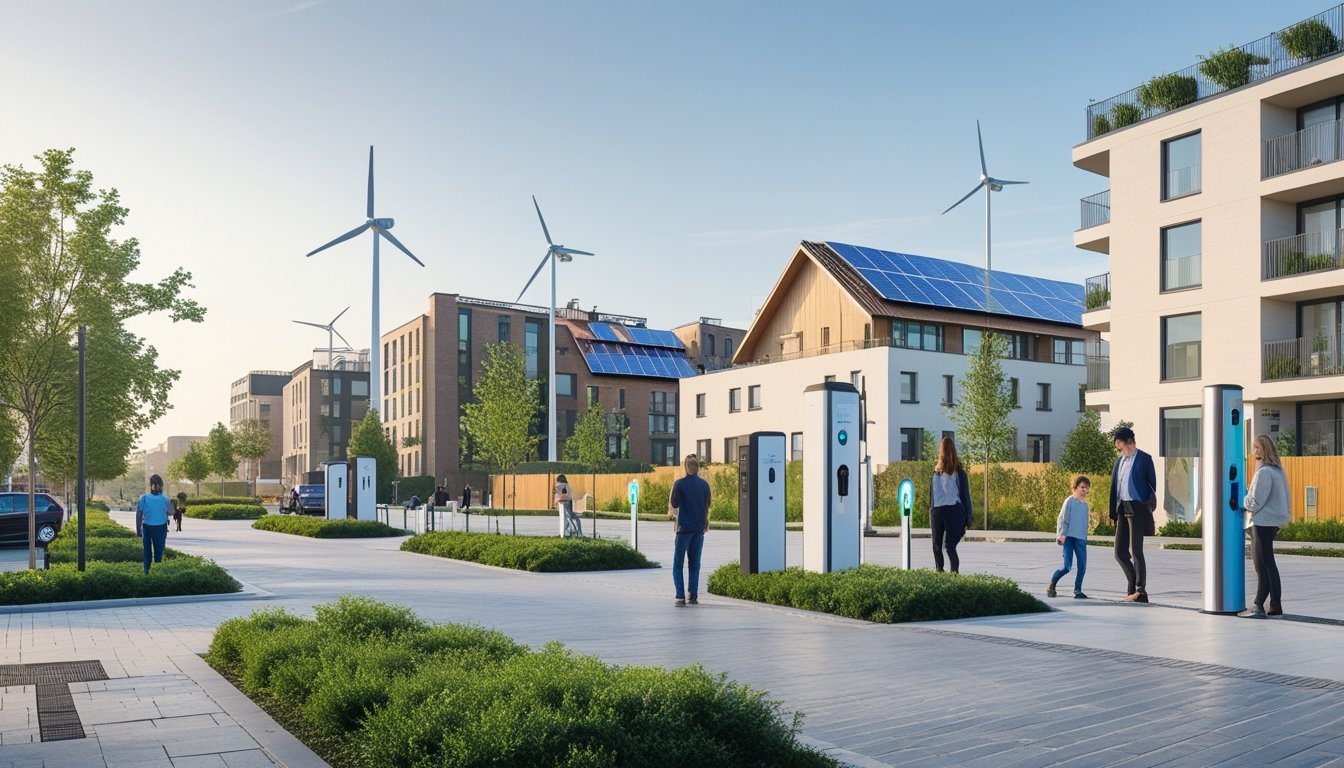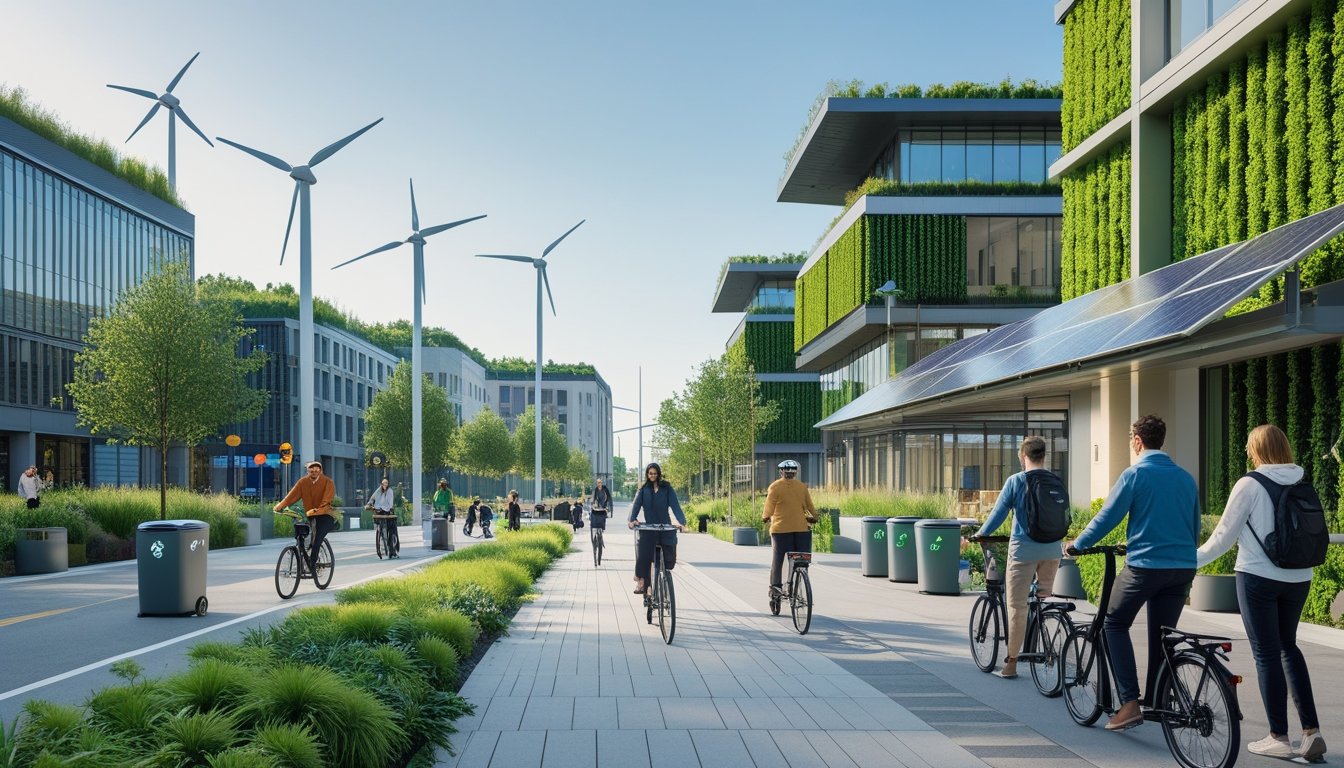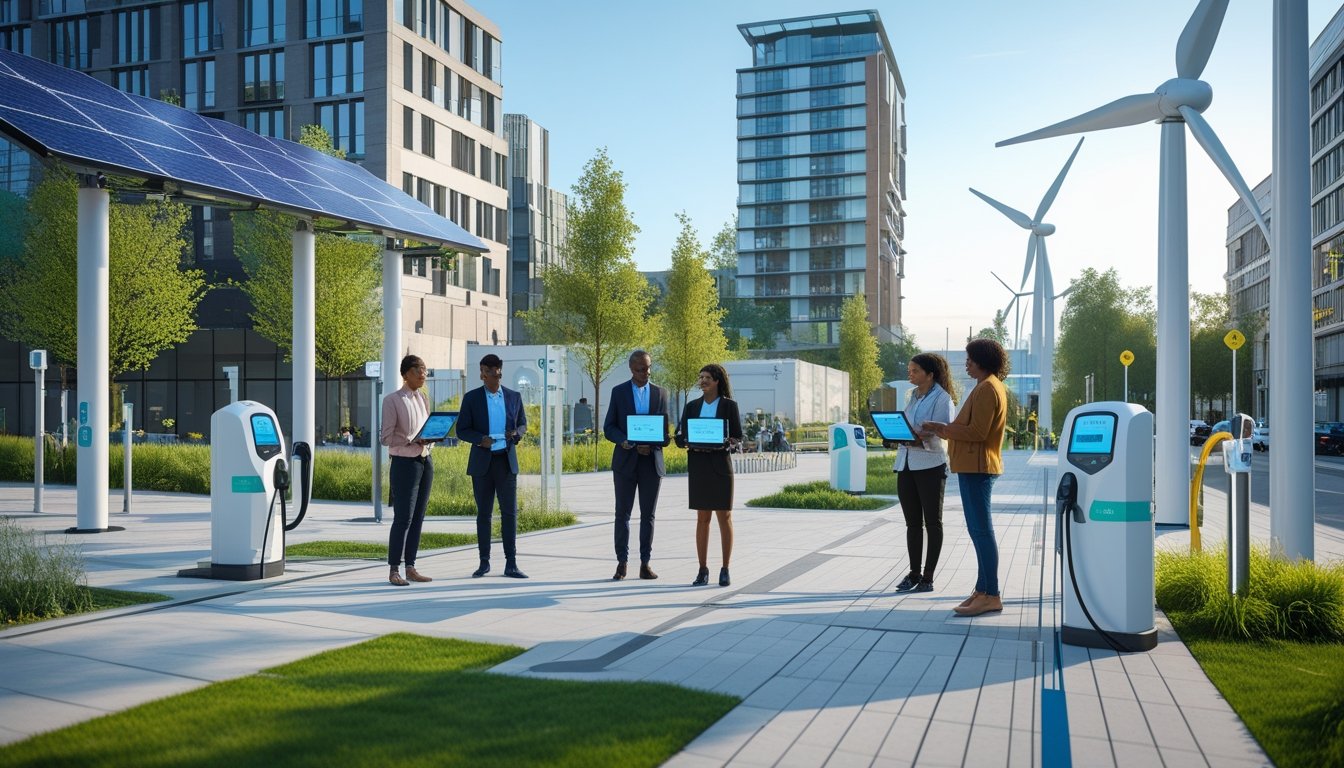Late updated: 26 Jun 2025 11:06
Written by: Oliver Bennett
Emerging Renewable Tech For Urban UK Areas: Innovations Shaping Sustainable Cities
The United Kingdom is charging forward in the quest for renewable energy, especially within its urban landscapes. As cities grapple with increasing energy demands, the need for innovative and sustainable solutions becomes paramount. Cutting-edge technologies, from bioenergy to district heating and battery storage, are reshaping how urban centres operate and thrive. New renewable technologies are not just promising but are essential for enhancing the sustainability and energy efficiency of urban UK areas.

Our cities serve as the epicentres of energy consumption, and with urbanisation on the rise, the integration of renewable technologies is not just a choice—it's a necessity. The UK government’s push for sustainable initiatives, such as the installation of heat pumps, highlights a commitment to cleaner energy alternatives. Companies like Zenobe Energy lead the charge, setting benchmarks in energy storage that pave the way for a fully renewable future.
Embracing new technologies not only addresses the growing energy demand but also positions urban areas as leaders in sustainability. The potential for transforming urban centres through renewable solutions is immense, offering both environmental benefits and energy security. This movement is redefining not only how we power our cities but how we envision a sustainable urban future.
Key Takeaways
- Emerging renewable technologies are transforming urban UK areas.
- Urban sustainability solutions are crucial for addressing rising energy demands.
- Innovative companies play a key role in advancing renewable energy initiatives.
Key Emerging Renewable Technologies Transforming Urban UK Areas
Our urban environments in the UK are undergoing a significant transformation through innovative renewable technologies. As cities seek sustainable solutions, we focus on cutting-edge developments in solar panels, wind turbines, and smart grids that integrate the Internet of Things (IoT).
Solar Panels and Solar PV Innovations
Solar panels are a cornerstone of urban renewable energy, and recent advancements in solar photovoltaic (PV) technology are making a substantial impact. New materials in PV cells capture solar energy with higher efficiency, allowing for more power generation even in less sunny weather conditions typical of the UK.
Innovative designs such as building-integrated photovoltaics (BIPV) enable seamless integration into building structures, including rooftops and facades. This design not only optimises energy generation but also maintains the aesthetic appeal of urban architecture. Moreover, advancements in energy storage technologies, such as battery systems, allow for better management of solar power, ensuring that energy generated during the day can be used during peak demand hours.
Advanced Wind Turbines in Urban Environments
Wind energy is another critical component of renewable energy sources in cities. New advanced wind turbines are designed specifically for urban environments. Their smaller size and quieter operation make them suitable for installation in densely populated areas without disrupting residents.
These turbines use real-time data analytics and artificial intelligence to optimise energy production by adjusting their operation based on wind patterns. This intelligence ensures maximum efficiency and reduces wear and tear, extending the operational life of these turbines. As wind contributes significantly to the UK’s green energy mix, urban wind solutions can further decentralise energy generation and enhance sustainability efforts.
Smart Grids and Internet of Things (IoT) Integration
Smart grids represent a sophisticated evolution in how we manage and distribute electricity. They incorporate IoT devices to facilitate real-time communication between consumers and energy providers. This connectivity allows for the efficient use of resources, better handling of energy storage, and proactive maintenance of the grid infrastructure.
The integration of renewable energy into these grids is crucial. Data analytics powered by AI can predict energy demand and optimise the delivery, ensuring that urban areas receive stable and sustainable power. With IoT, our smart grids become dynamic systems, constantly adapting to changing conditions and improving the resilience of our energy networks.
Urban Sustainability Solutions and Impact

Urban areas in the UK are on the frontline of implementing sustainable solutions needed to tackle climate challenges. Our goal is to enhance energy efficiency, reduce carbon footprints, and improve urban living through sustainable mobility and green infrastructure.
Energy Efficiency through AI and Data Analytics
Artificial Intelligence (AI) and data analytics are revolutionising energy management in cities. Through smart city initiatives, real-time data is collected, enabling energy optimisation—from electricity use in buildings to public lighting systems. Machine learning algorithms evaluate this data to predict peak energy demands and reduce wastage, thereby enhancing energy efficiency.
A noteworthy development is the use of digital twins, which simulate urban environments to optimise energy distribution and storage. With climate change prompting extreme weather events, climate-resilient infrastructure fortified by AI can lead to more robust urban systems. Furthermore, communities benefit through public-private partnerships that invest in sustainable energy solutions, thus improving quality of life.
Decarbonisation and Carbon Footprint Reduction
Decarbonisation is at the heart of our efforts to reduce carbon emissions. Cities are leveraging renewable sources like solar, wind, and bioenergy—with biomass standing out due to its capacity for energy storage solutions. These sustainable energy sources are crucial in our drive towards carbon neutrality.
Engagement with international climate agreements ensures that our decarbonisation strategies are aligned with global efforts. By focusing on carbon footprint reduction, urban planning integrates energy-efficient infrastructures, thereby reducing reliance on fossil fuels. Energy security is improved, and with reduced greenhouse gas emissions, urban areas contribute significantly to climate change mitigation.
Sustainable Mobility and Urban Green Spaces
Sustainable mobility is transforming urban transportation. The integration of electric vehicles and the expansion of cycling lanes reduce urban congestion and air pollution. We see a push towards mixed-use developments, which encourage walking and use of public transport.
Urban planning prioritises green spaces to improve air quality and provide communal recreational areas. Community engagement in initiatives like rooftop gardens and green rooftops supports biodiversity and enhances urban aesthetics. Such green infrastructure not only contributes to climate-resilient cities but also boosts mental health and well-being among residents, making urban areas more liveable and sustainable.
Frequently Asked Questions

Our exploration centres on effective solutions for integrating renewable energy in urban homes across the UK. We will address solar panel benefits, financial incentives, energy efficiency, and key companies shaping this transition.
What are the most effective renewable energy solutions for urban homes in the United Kingdom?
Air source heat pumps and solar panels are proving to be among the most effective solutions. Urban settings benefit from their compact installation needs and the reduction in carbon footprint they provide. These technologies align well with government goals to enhance energy sustainability in cities.
How do solar panel installations contribute to energy savings in urban areas?
Solar panels are capable of significantly reducing electricity bills for urban residents by generating renewable energy onsite. They harness the sun's energy to power homes, slashing reliance on the grid and contributing to long-term cost savings. This also aids cities in meeting environmental targets.
Can urban residents in the UK access grants or subsidies for installing renewable energy systems?
Yes, various government schemes support this transition. Residents can benefit from grants and subsidies, such as the Green Homes Grant, which alleviates the initial investment needed for renewable technologies, making them more accessible to homeowners in urban areas.
What are the latest energy efficiency improvements recommended for city dwellings?
Improving insulation, upgrading windows to double or triple glazing, and installing smart thermostats are among the advised improvements. These measures enhance the energy efficiency of homes, reducing energy consumption and emissions whilst offering cost savings over time.
Which companies are leading in providing renewable energy services to urban households in the UK?
British Gas, Octopus Energy, and Bulb are notable providers leading the way. These companies offer comprehensive renewable energy solutions tailored to urban environments, focusing on both installations and energy supply, thus supporting the broader adoption of clean energy.
How does the Energy Saving Trust support urban residents in transitioning to renewable energy?
The Energy Saving Trust offers guidance and resources to help residents make informed decisions. This includes detailed advice on energy efficiency measures, available grants, and renewable energy technologies suitable for urban settings, fostering informed and sustainable energy choices.
